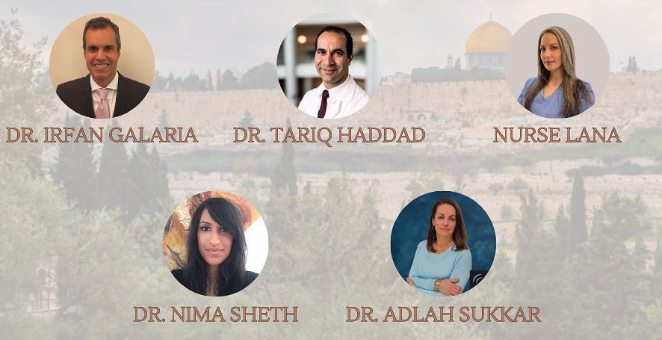Academic organizations at Georgetown University brought together an April 5 panel of medical professionals and humanitarian volunteers with firsthand experience in Gaza.
Hosted by the Center for Contemporary Arab Studies (CCAS), the School of Foreign Service (SFS) and the School of Medicine (SOM), panelists sought to highlight the challenges health care professionals face as a result of the ongoing humanitarian crisis in Gaza. Organizers hoped the event would inspire the Georgetown community to channel their frustration and sadness into action.
Ruba Omeira (MED ’24), one of the event’s organizers, said the context for the event is particularly pressing as medical workers in Gaza struggle to meet the health needs of their community.
“As healthcare workers it is our duty to protect and preserve life. With the collapse of Gaza’s healthcare infrastructure, medical humanitarian aid has become more critical than ever,” Omeira wrote to The Hoya. “Healthcare professionals in Gaza have struggled to offer even the most basic care to patients due to dwindling resources and a healthcare system on the brink of collapse.”
Dr. Tariq Haddad, a cardiologist and panelist at the event, offered a personal account of what living in the region is like based on his experience growing up in Gaza.
“Occupation is violent. Every aspect of your life is controlled when you’re living in an occupied state,” Haddad said at the event. “It is impossible to build a home, a life.”
The crisis is compounded by the lack of resources and medical professionals in Gaza — the United Nations estimates the average person in Gaza is living on just three liters of water per day, well below the World Health Organization’s accepted international emergency threshold of 15 liters per person per day. The few hospitals that remain open are operating without necessary equipment, medications, nurses, physicians and surgeons.
Dr. Nima Sheth, a psychiatrist and event panelist who has experience working with Palestinians in the West Bank, said there is a worsening mental health crisis in Gaza. She explained how conflict has resulted in a significant increase in rates of depression, anxiety, stress and PTSD in Palestinians, especially children.
At the event, Sheth cited many factors in contributing to the rising onset of mental health disorders in Gaza.
“There are a lot of things contributing to the high rates we are seeing, including geographical blockages, Israeli checkpoints, building demolitions, unemployment, famine, disease and the destruction of families, homes and sacred places,” Sheth said at the event.
Lana, a panelist and health care professional who just completed a humanitarian mission in Gaza, said she saw an intense scarcity of resources during her mission. She chose to use only her first name out of safety concerns.
“Crossing the border was like crossing into a different world. There was just a constant background noise of drones and distant bombings,” Lana said at the event. “It was surreal.”
Dr. Irfan Galaria, a panelist and plastic and reconstructive surgeon who just returned from a 10-day humanitarian mission in Gaza, said he admires the courage, tenacity and optimism of health care workers in Gaza.
“I am here today to support the students of Georgetown. I understand where you’re coming from, the frustration you feel. I remember being in your shoes during the Bosnian genocide of the late ’90s. I was fundraising and attending protests, yet I felt it wasn’t enough,” Galaria said at the event. “I encourage you to channel your frustrations into motivation to make change.”
Dr. Adlah Sukkar, a pulmonologist and critical care physician on the panel, said she and her colleagues in Doctors Against Genocide, a global coalition of health care workers dedicated to confronting and preventing genocide, are urging leaders on Capitol Hill to prioritize the delivery of medical aid to Palestine.
“The mainstream medical community has not been effective in working proactively against war crimes and genocide,” Sukkar said at the event. “We felt the need to fill the gap between our oath to do no harm and our ability to prevent harm.”
Omeira hopes the stories of those who have had firsthand experience in Gaza will inspire action and foster a sense of community among Georgetown students and medical professionals.
“We wanted this event to directly connect and align with the events happening on the ground in Gaza. We were so moved by the incredible stories of healthcare workers in Gaza and their unwavering bravery. We knew that to truly understand the situation, we needed to hear from those on the ground,” Omeira said.
“In medicine, regardless of when or where you studied, we are all bound together by a shared commitment to the health and well-being of our patients,” Omeira added.









